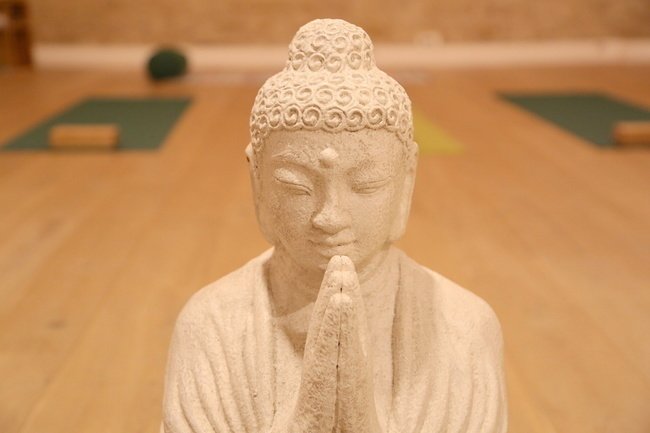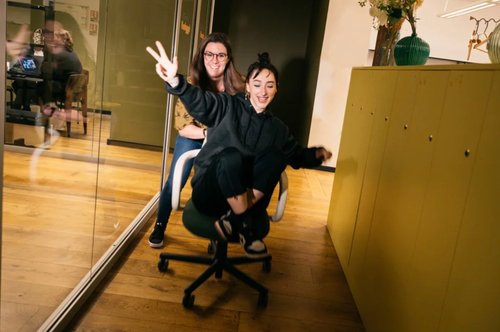The benefits of meditation on your work
Mar 25, 2020
4 mins

If you think meditation is all about sitting cross-legged with your eyes closed while chanting in a trance-like state, this article might well change your mind.
Mindfulness meditation in the workplace is supposed to help employees focus on the present and provide relief from the anxiety and stress of everyday life. This wellness trend has made its way into multinationals such as Apple, Nike, Yahoo, and Google. Meditation allows us to focus on ourselves yet encourages goodwill and kindness toward others. However, it’s hard to know where to start, given the thousands of articles you might find on the subject.
Here we explain the benefits of meditation, as well as suggest methods and tools help you try it out.
The benefits of meditation
“Some people become calmer, others become kinder to themselves. Other people become more creative because their minds become clearer […] and the benefits go beyond professional settings”— Chade-Meng Tan, Google’s former personal growth guru who designed the course Search Inside Yourself.
1. Meditation makes you more resilient
Several studies have proved that meditation can reduce anxiety and increase stress resilience and resistance. Meditating helps you keep your cool and allows you to gain some perspective before searching for solutions and solving problems.
The facts speak for themselves: following a seven-week meditation course, out of 123 General Mills managers, 58% claimed that they felt capable of clear reasoning even under pressure compared with 32% before the course.
2. Meditation boosts emotional intelligence
Brain imaging research has shown that meditation can enhance your ability to control emotions, which means you manage professional and social interactions within a group better. Consequently, you will take professional exchanges less personally and remain calm and collected throughout.
3. Meditation makes you more creative
Meditation encourages divergent thinking—proposing as many solutions as possible when confronted with a problem—which is a key part of creativity. It, therefore, encourages “improvisational thinking”, which opens the floodgates in terms of new ideas. This is a major plus for start-up employees who must constantly innovate.
4. Meditation increases your attention span and improves concentration levels
On average, we are capable of 90 minutes of full concentration, and that’s not even taking into account the numerous interruptions that we have to deal with and the fact we are supposed to multitask. Studies have indicated that regular meditation increases our ability to ignore distractions, improves our ability to stay focused, and even boosts memory. According to a study by The Institute of Mindful Leadership, after being introduced to meditation, only 2% of participants found it difficult to focus on a project from start to finish compared with 28% before the course.
5. Meditation changes the way you look at yourself
Meditation teaches us how to be kind to ourselves as well as others. Long term, it brings a feeling of fulfillment, it can make you feel less emotionally exhausted and will give you a real sense of personal achievement. Whenever you have a heavy workload you will feel less emotionally drained and be able to maintain your work-life balance, which gives you the upper hand when you have to remain motivated and positive.
6. Meditation protects the brain
Even more surprisingly, researchers have proved that long-term meditation can have a neuroprotective effect. A team from the University of California discovered that meditation can protect our brains from decline by reducing the usual loss of brain cells that is part of the aging process. That’s another good reason to start meditating right now.
How to make meditating part of your life
1. Find the right setting
Meditation, like any other habit that isn’t part of your usual routine, requires practice and commitment. Meditating on your own demands a high level of self-discipline, so it’s a good idea to start with group sessions. This means there’s all the more reason to try and get it into the office. During this time of self-isolation, meditating with others via a group video chat is a great idea.
2. Discover your own rhythm
Try about 10 minutes of meditation every morning or as a break in the middle of the day. Meditating is a very personal experience, but you don’t have to start with really long sessions to feel the benefits. For example, you could do a few minutes just before an important deadline. Just three minutes of mindful breathing can evoke physical and mental calm.
Chade-Meng Tan recommends starting off with this short yet effective exercise that you can do between meetings. It’s based on taking three deep breaths. “When you take the first one, you concentrate on relaxing your whole body. With the second one, you will probably still feel a bit of tension in your face and so try and relax those muscles. With your third breath say that you hope the person who is going to join you for your meeting will be happy too.” He also recommends starting a meeting with two minutes of absolute calm. This will change the atmosphere and focus everyone’s attention.
3. Find the right tool to get you started
The four most useful apps to start your meditation journey:
Smiling Mind is a 100% not-for-profit free app developed by psychologists and educators to try and bring meditation into our lives.
Mindfulness is used by millions of meditators in more than 130 countries. This app offers a five-day guided practice that includes an introduction to mindfulness.
Headspace is probably the most popular app of all. There’s a free package that teaches you the essentials and about mindfulness in general.
Zenfie is a free introductory course that offers ten sessions that last ten minutes each.
Four books about meditating at work
The Mindful Workplace: Developing Resilient Individuals and Resonant Organisations With MBSR – 2013 – Michael Chaskalson
Search Inside Yourself – 2013 – Chade-Meng Tan
Mindfulness. A Practical Guide to Finding Peace in a Frantic World – 2013 – Mark Williams and Danny Penman
Mindfulness at Work: How to Avoid Stress, Achieve More and Enjoy Life! – 2013 Stephen MacKenzie
Translated by Mildred Dauvin
Photo: WTTJ @Yoga Searcher
Photo: Welcome to the Jungle
Follow Welcome to the Jungle on Facebook, LinkedIn, and Instagram, and subscribe to our newsletter to get our latest articles every day!

More inspiration: Manage your stress

Digital debt: when Slack and Zoom kill your productivity... and mental health
Notification overload isn't only a distraction disaster but can lead to severe stress, anxiety and even burnout
Jul 06, 2023

What is positive stress?
Stress boosts our focus, resilience and energy but can also burn us out. So when does one of our greatest assets become an enemy?
Jun 13, 2023

Surviving the startup jungle: thriving in a fast-paced work environment
As Mental Health Awareness Month comes to an end, we take a look at how to build resilience in a fast-paced environment.
May 29, 2023

When stress becomes your ally
Focus, problem solving and creativity are all products of positive stress. But how do you harness the power of adrenaline without its side effects?
Nov 14, 2022

Heads up, here’s how to deal with cognitive overload at work
Beware of mental overload at work! Find out how to maintain your cognitive balance in the era of open-plan offices and endless notifications.
Aug 23, 2022
The newsletter that does the job
Want to keep up with the latest articles? Twice a week you can receive stories, jobs, and tips in your inbox.

Looking for your next job?
Over 200,000 people have found a job with Welcome to the Jungle.
Explore jobs